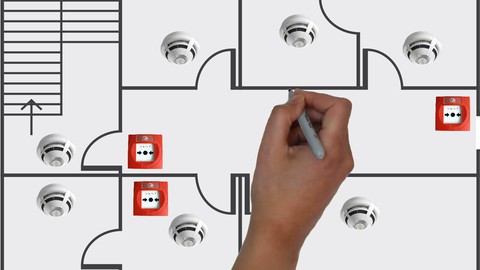
Design of Fire Alarm Systems based on NFPA 72 codes
Design of Fire Alarm Systems based on NFPA 72 codes, available at $49.99, has an average rating of 4.34, with 26 lectures, 4 quizzes, based on 56 reviews, and has 218 subscribers.
You will learn about Design fire alarm systems for any type of project. Fundamentals and operation of fire alarm systems Prepare to become NFPA 72 certified Design a fire alarm system of a hotel Interpret and correctly apply the codes presented in NFPA 72. Locate information in NFPA 72 code. Evaluate the systems that interact with fire alarm systems. Documentation required for a fire alarm design Battery and voltage drop calculation Fill a activation Matrix This course is ideal for individuals who are Any professional or student who wishes to become NFPA 72 certified. or Engineers, architects, installers wishing to learn about fire protection systems or Architects and pre-sales engineers. or Inspectors, supervisors, resident engineers and any personnel involved in construction works. It is particularly useful for Any professional or student who wishes to become NFPA 72 certified. or Engineers, architects, installers wishing to learn about fire protection systems or Architects and pre-sales engineers. or Inspectors, supervisors, resident engineers and any personnel involved in construction works.
Enroll now: Design of Fire Alarm Systems based on NFPA 72 codes
Summary
Title: Design of Fire Alarm Systems based on NFPA 72 codes
Price: $49.99
Average Rating: 4.34
Number of Lectures: 26
Number of Quizzes: 4
Number of Published Lectures: 26
Number of Published Quizzes: 4
Number of Curriculum Items: 30
Number of Published Curriculum Objects: 30
Original Price: $54.99
Quality Status: approved
Status: Live
What You Will Learn
- Design fire alarm systems for any type of project.
- Fundamentals and operation of fire alarm systems
- Prepare to become NFPA 72 certified
- Design a fire alarm system of a hotel
- Interpret and correctly apply the codes presented in NFPA 72.
- Locate information in NFPA 72 code.
- Evaluate the systems that interact with fire alarm systems.
- Documentation required for a fire alarm design
- Battery and voltage drop calculation
- Fill a activation Matrix
Who Should Attend
- Any professional or student who wishes to become NFPA 72 certified.
- Engineers, architects, installers wishing to learn about fire protection systems
- Architects and pre-sales engineers.
- Inspectors, supervisors, resident engineers and any personnel involved in construction works.
Target Audiences
- Any professional or student who wishes to become NFPA 72 certified.
- Engineers, architects, installers wishing to learn about fire protection systems
- Architects and pre-sales engineers.
- Inspectors, supervisors, resident engineers and any personnel involved in construction works.
Every day we see more complex constructions with more demanding requirements, which require extensive knowledge of the concepts and standards by engineers and architects for the design of fire alarm systems as well as field personnel responsible for installations and testing.
In this course you will learn the design procedures and calculations of fire alarm systems while clarifying the concepts of each component. It is designed for beginner students as well as professionals with previous knowledge in fire alarm systems.
The course uses a theoretical/practical methodology so we will be working together on a Hotel project design, where we will have to make calculations and locate the different components based on what NFPA 72 standarizes. Before working on the design we will focus on reviewing each component of a fire alarm system, how it works and interacts with other system.
What concepts will you learn in this course?
-
Concepts of a fire alarm system:
-
Main Panel Characteristics
-
Types of detectors
-
Pull stations
-
Input and output modules
-
Horns, loudspeakers and strobe lights
-
Wiring
-
-
Interaction of fire alarm systems with other systems:
-
Sprinkler systems
-
Clean agent suppression systems
-
Kitchen hood suppression systems
-
Air sampling detection
-
Air conditioning systems
-
Elevators
-
Stairway pressurization systems
-
Doors
-
-
NFPA 72 Standard Concepts
-
We will study the composition of all the chapters.
-
We will study concepts such as coverings and spacing of devices.
-
Occupancy type and hazard
-
-
Design of a real fire alarm system for a Hotel
-
Location devices following NFPA 72 and other standards
-
Calculations
-
Minimum documentation to include in your design
-
Voltage drop calculation
-
Calculation of wiring voltage drop
-
Activation matrix
-
Course Curriculum
Chapter 1: Introduction
Lecture 1: Introduction
Chapter 2: Concepts of Fire Alarm Systems
Lecture 1: Parts of a fire alarm system
Lecture 2: Conventional vs Addressable systems
Lecture 3: Wiring
Lecture 4: Fire Alarm Panel
Lecture 5: Pull Stations
Lecture 6: Smoke Detectors and Heat Detectors
Lecture 7: Beam Detectors
Lecture 8: Duct Detector
Lecture 9: Air Sampling detector
Lecture 10: Other detectors
Lecture 11: Input Modules
Lecture 12: Output Modules
Lecture 13: Audible and Visible Notification and voice emergency notification
Chapter 3: NFPA 72
Lecture 1: Introduction
Lecture 2: Chapter 7 – Documentation
Lecture 3: Chapter 10 – Qualified Personnel
Lecture 4: Chapter 14 – Inspection, test and maintenance
Lecture 5: Chapters – Fire alarma systems elements
Lecture 6: Annexes
Chapter 4: Practice – Designing Fire Alarm system of an Hotel
Lecture 1: Introduction
Lecture 2: First Level Design
Lecture 3: Second and Third Level Design
Lecture 4: Fire Alarm Panel and Wiring Design
Chapter 5: Design documentation
Lecture 1: Battery calculation, wiring voltaje drop and activation matrix
Chapter 6: Conclusion
Lecture 1: Course conclusions
Instructors
-
CKA Coaching and Consulting
Teacher
Rating Distribution
- 1 stars: 1 votes
- 2 stars: 1 votes
- 3 stars: 8 votes
- 4 stars: 17 votes
- 5 stars: 29 votes
Frequently Asked Questions
How long do I have access to the course materials?
You can view and review the lecture materials indefinitely, like an on-demand channel.
Can I take my courses with me wherever I go?
Definitely! If you have an internet connection, courses on Udemy are available on any device at any time. If you don’t have an internet connection, some instructors also let their students download course lectures. That’s up to the instructor though, so make sure you get on their good side!
You may also like
- Top 10 Content Creation Courses to Learn in December 2024
- Top 10 Game Development Courses to Learn in December 2024
- Top 10 Software Testing Courses to Learn in December 2024
- Top 10 Big Data Courses to Learn in December 2024
- Top 10 Internet Of Things Courses to Learn in December 2024
- Top 10 Quantum Computing Courses to Learn in December 2024
- Top 10 Cloud Computing Courses to Learn in December 2024
- Top 10 3d Modeling Courses to Learn in December 2024
- Top 10 Mobile App Development Courses to Learn in December 2024
- Top 10 Graphic Design Courses to Learn in December 2024
- Top 10 Videography Courses to Learn in December 2024
- Top 10 Photography Courses to Learn in December 2024
- Top 10 Language Learning Courses to Learn in December 2024
- Top 10 Product Management Courses to Learn in December 2024
- Top 10 Investing Courses to Learn in December 2024
- Top 10 Personal Finance Courses to Learn in December 2024
- Top 10 Health And Wellness Courses to Learn in December 2024
- Top 10 Chatgpt And Ai Tools Courses to Learn in December 2024
- Top 10 Virtual Reality Courses to Learn in December 2024
- Top 10 Augmented Reality Courses to Learn in December 2024






















